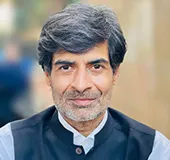French President Francois Hollande is arriving in the Indian capital on Thursday (February 14, 2013) for confabulations with the Indian leadership. This first visit of the new French president is missing the hype and hoopla that would have accompanied, say, a visit by the US president. Perhaps this is a reflection of the persona of the man, who is stated to have an understated style. Or is it a sign of the strength and maturity of the bilateral relationship?
France is arguably India's longest standing all-weather friend, save Russia. It sought to limit the impact of the US-led anti-India sanction regime following the nuclear tests in 1998. It was the first to propose the integration of India into the global order, and it has been the first and most vocal supporter for India's inclusion in the Security Council as a permanent member.
This is indeed a good time to move the engagement from one that is still tactical and transactional to one that is more strategic and sustainable. This partnership must be consummated with determined progress on five fronts.
The first is to realign cooperation in the defence sector. Multibillion dollar transactions are on the anvil with sales of aircrafts under negotiation, agreements on co-production of missiles, technology for the Tejas aircraft and a submarine deal. India has served as a lucrative market for French defence industry; the relationship now needs to move beyond this 'vendor-buyer' paradigm.
It must strive to unleash the market potential and entrepreneurial dynamism of the Indian private sector in tandem with French capabilities. While the glass ceiling that excludes private enterprise remains, some developments give hope and direction.
The local subsidiary of DCNS, a French company, has teamed up with private Indian defence component manufacturers to coproduce equipment for Scorpene class submarines. Can we be ambitious and jointly build nuclear submarines as well? This is something that the French are working on with Brazil already. Similarly, can the French Thales Group and an Indian company create armoured personnel carriers like they have done with Australia? Can we hope to jointly develop drones and unmanned combat aerial vehicles, needed for the asymmetric battlefields of the 21
st century?
This ambitious co-creation agenda leads us to the second project that India and France must embark upon. There is urgent need for a roadmap leading to India's entry into the four global export control regimes. France must work with the Europeans and the US to facilitate India's entry into the Nuclear Suppliers Group, the Missile Technology Control Regime, the Australia Group and the Wassenaar Arrangement. Membership of the four regimes will allow partnerships and development of new markets in the large high-tech sector for defence and civilian applications.
The third area of focus must be India's civil nuclear sector. India and France have partnered on civil nuclear energy initiatives since 2008, with France being the first country to sign a civil nuclear agreement with India. Nicolas Sarkozy had promised "full" civil nuclear cooperation, including the transfer of uranium enrichment technology. Hollande must now implement that promise.
Without access to enrichment technology, the growth of nuclear energy in the country will remain modest and India's ability to emerge as supplier of a full range of nuclear services will be limited. The opportunity to develop India's manufacturing industry to cater to the nuclear sector at home and abroad is immense. France is the most obvious partner and co-beneficiary.
Fourth, homeland security offers broad scope for collaboration. Faced with threats ranging from cyber attacks to terrorism, India can benefit from best in class French security technologies. The Safran Group offers a spectrum of security solutions and is a world leader in biometric technologies. It is already engaged with the Unique Identification Authority of India.
The Thales Group offers a range of integrated security solutions for urban infrastructure and has been in India since 1953. There is a growing appetite for the sector within Indian corporations. The two governments must act in concert and provide policy signals that catalyse this private sector interest.
Finally, both countries must start looking together at the region and the world. The Indian Ocean is an important region for both countries. France has long been an Indian Ocean power with numerous bases in the region, and is dependent on oil imports from the region much like India.
A Franco-Indian vision document could be a vital first step towards developing a cooperative framework for stability and security in the region. It would help the two countries understand capacity hurdles and technology gaps that need to be overcome. Be it cooperation on maritime domain awareness, submarines, missiles or at the very least joint operations, anti-piracy efforts, information sharing and data access, the scope is immense.
The relationship must be purposeful, nimble and creative. If the Rafale negotiations hit turbulence on price issues, India's interests in obtaining certain technologies could offset this hurdle. Similarly, a repeat order for Scorpene class submarines could be considered alongside co-development of nuclear submarines that India seeks for a credible triad. As the world becomes increasingly fragmented, and interests dictate relationships, France and India have a historic opportunity to circumscribe their interests within a comprehensive strategic framework of cooperation.
(The writer is a Vice President at Observer Research Foundation)
Courtesy: The Times of India,
The views expressed above belong to the author(s). ORF research and analyses now available on Telegram! Click here to access our curated content — blogs, longforms and interviews.




 PREV
PREV


